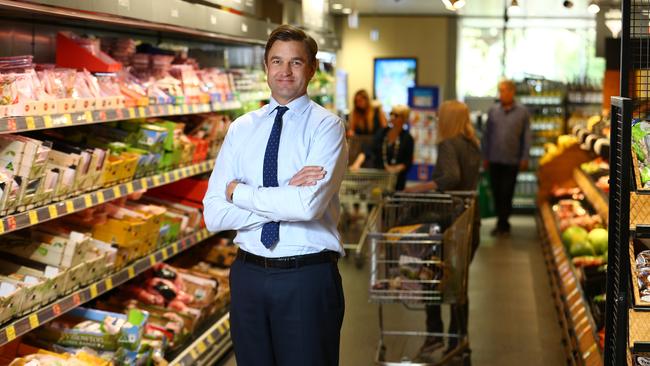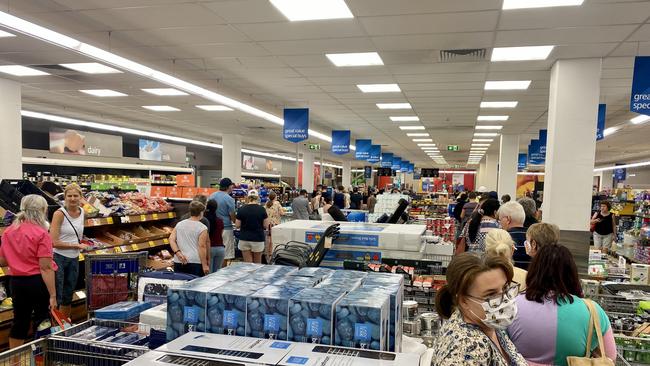Aldi Australia cracks $10bn in sales
German-owned supermarket Aldi has signed-off its second decade in Australia cracking $10bn in annual sales.

German-owned supermarket Aldi has signed-off its second decade in Australia cracking $10bn in annual sales and closing in on 600 stores as it rides out double-digit growth.
Aldi chief executive Tom Daunt said the supermarket operator is in a position of strength after almost complete a refurbishment of its network of 570 stores and an overhaul of its fresh food offer to take on bigger rivals Woolworths and Coles.
Mr Daunt said Aldi has come far from the time when its German owners, the Albrecht family, first considered a move to Australia that came with only “modest expectations”.
Over that time Aldi has evolved from targeting budget conscious shoppers in outer suburbs to becoming a magnet for higher-end customers looking to pick-up a discount in the annual ski gear sale as well as the weekly shop.
“It feels like it has gone very quickly, but we have dramatically changed the retail landscape in that time and I think that is recognised by all market observers including our owners who came to Australia with fairly modest expectations, and a somewhat quirky and different kind of grocery store,” Mr Daunt told The Australian.
Aldi is planning to open another 20 stores this year. Mr Daunt said the business was strong enough to ride out any shocks to the economy including the logistical challenges of Covid.
“I would say we are well placed no matter what happens with the economy, we have got a really good offer, a store full of high quality products that people who are well off and doing well appreciate but in the harder economic times and for those families who are less fortunate we offer a really compelling value proposition,” Mr Daunt told The Australian.

Mr Daunt said he believed as the COVID-19 vaccine is rolled out this year and restrictions are eased there would be a return to “something like normal” for the consumer although there would still be some “scar tissue” to deal with in an economic sense.
“I wouldn’t want to be anywhere else other than Australia right now.
Since Aldi burst on to the nation’s grocery market it has grown to have stores in all parts of the country other than Tasmania and the Northern Territory and capture a 10 per cent market share.
Mr Daunt told The Australian that in 2020 it had another strong year with Aldi sales up 10 per cent to around $10.5bn. This has seen it strip customers from Woolworths, Coles and the independents and injected much-needed competitive heat into the supermarket sector.
A report Aldi has commissioned from PwC estimated that Aldi has contributed a total of $30.2bn to the Australian economy with new and upgraded stores, local business partnerships and jobs.
Aldi said its shoppers save $2.4bn per year when they shop at Aldi compared to other major supermarkets while the total savings for all shoppers in Australia generated by its competitive pressure and low prices was $6.6bn over Aldi’s 20 years in operation.
Arguably Aldi’s presence in the Australian market has also influenced an increase in consumption of private labels which are commonplace at Coles and Woolworths.
“The founding principle of our Australian business back in 2001 was to offer a carefully-selected range of great quality products at the lowest prices. Whilst we’re continuing to innovate to give customers an even better experience and greater convenience, our core philosophy remains unchanged,” said Mr Daunt.

A recent push into South Australia and Western Australia has accelerated its store count to 570 and in 2017 the retailer embarked on a refurbishment program to update all its stores and in particular improve its fresh food offer which traditionally had been a weaker part of the Aldi offer.
Mr Daunt said that refurbishment program costing hundreds of millions of dollars had allowed Aldi to generate stronger sales in fresh food compared to the rest of the business.
“We are very happy with it (fresh offer) and our customers are I guess thanking us with their recognition of the same thing, so we have now upgraded around 95 per cent of our stores … we have expanded and refreshed our store interior and merchandising.
“We have seen huge growth in fruit and vegetables, in fresh meat sales and chilled products generally, we have moved those to the front of the stores, they are more prominent, we have worked hard on the quality and availability of them. Customers have rewarded us with a lot of growth in those fresh categories, and the fresh categories growth has exceeded our total business growth.”




To join the conversation, please log in. Don't have an account? Register
Join the conversation, you are commenting as Logout